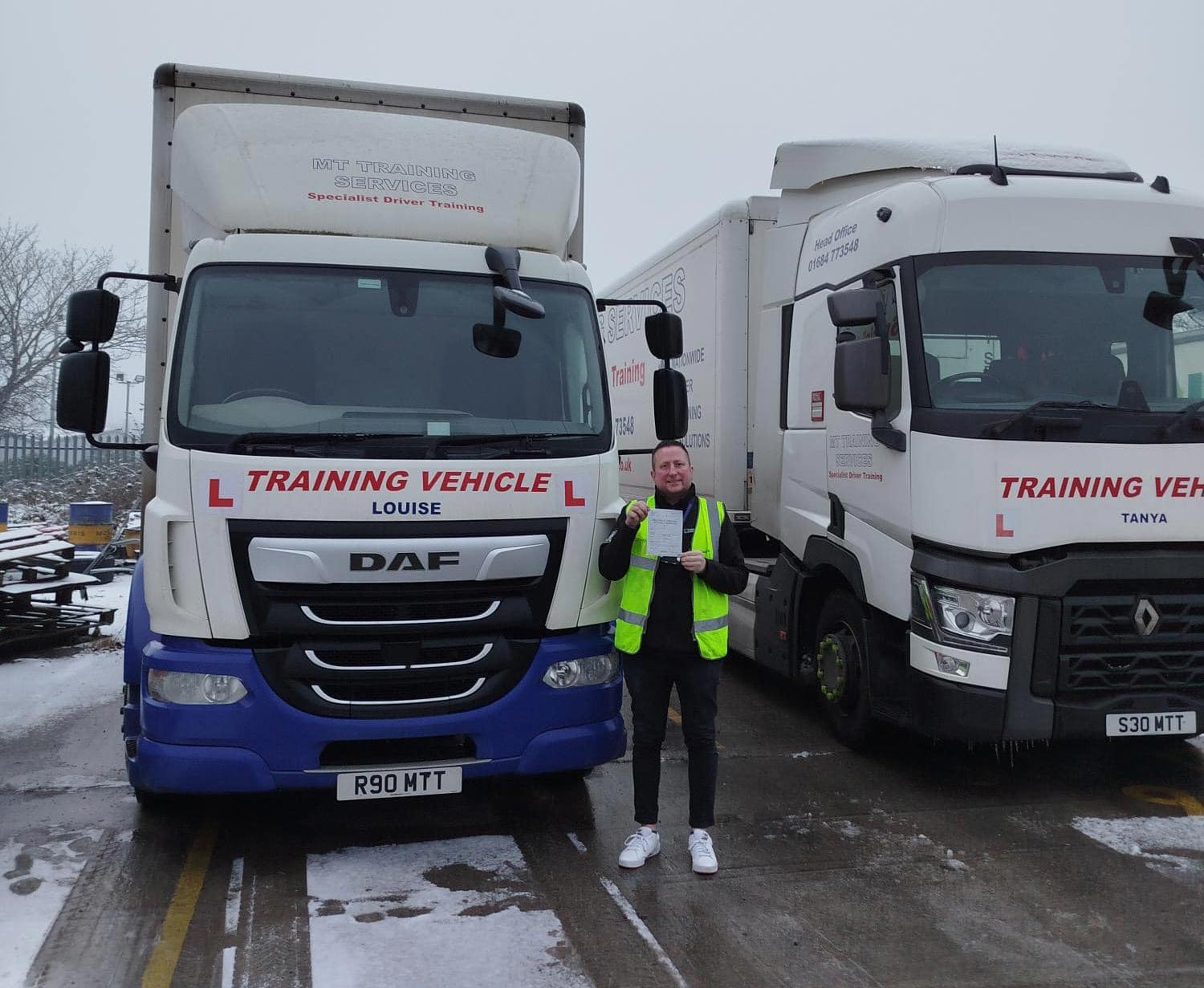Here at MT Training’s Manchester Training Centre, we’ve been celebrating a recent success story: Simon, one of our dedicated learners, passed his Category C 3b test on his very first attempt yesterday! While it is undoubtedly exciting to share news of an individual accomplishment, this milestone also highlights a broader topic of increasing importance: quality HGV driver training in Manchester. If you’re considering a career in haulage, transport, or logistics, or if you’re simply curious about what it takes to earn a professional driving qualification, this article will walk you through the fundamentals. We’ll explore the significance of the 3b test, the benefits of learning in Manchester, the techniques we use to train our candidates, and how you can set out on your own HGV journey.
1. The Importance of HGV Driver Training
Before delving into Simon’s achievement and the specifics of the 3b test, it’s worth understanding why HGV driver training matters so much in the first place. Heavy Goods Vehicles (HGVs)—also known as Large Goods Vehicles (LGVs)—are integral to the UK economy. They transport goods across the country, connect supply chains, and ensure that businesses and consumers receive the products they need. With the rise of e-commerce and online retail, the demand for well-trained and competent HGV drivers has never been greater.
Obtaining an HGV licence goes beyond passing a test. It represents a commitment to safety, professionalism, and responsibility on the road. HGVs are substantially larger and heavier than ordinary cars, requiring heightened awareness, precise vehicle handling, and a thorough understanding of road regulations. Consequently, HGV driver training must be both practical and comprehensive to ensure that newly qualified drivers can operate these vehicles with confidence.
Moreover, pursuing professional driver training can open doors to a stable and rewarding career path. From local delivery roles that keep you close to home to long-distance haulage jobs that take you on cross-country routes, an HGV licence offers substantial career flexibility. Drivers often find that their new skills not only enhance their earning potential but also provide a sense of job security in an industry that consistently requires capable and licensed professionals.
2. Introducing the Category C 3b Test
The HGV qualification process in the UK involves multiple stages, and for many aspiring drivers, passing the 3b test is a highlight of their journey. So, what is this 3b test all about?
- Category C Licence Overview: A Cat C licence enables you to drive a large goods vehicle over 3.5 tonnes (up to 32 tonnes), which is often referred to as a rigid truck. This licence is crucial for a range of professional roles, from supermarket delivery trucks to construction lorries.
- The 3a and 3b Elements: Achieving a full Cat C licence typically involves completing both the 3a and 3b components. The 3a portion is the off-road manoeuvring test, which evaluates your ability to position and reverse the vehicle safely in a controlled environment. Once you’ve nailed the fundamentals of vehicle control off the road, you progress to the 3b test, which takes you onto public roads.
- Focus of the 3b Test: The 3b test is the practical on-road assessment. During this exam, a DVSA examiner observes your driving to ensure that you can handle the vehicle effectively in real-world traffic. You’ll be asked to navigate various road types—residential streets, busy urban routes, dual carriageways, and roundabouts—and demonstrate accurate use of mirrors, signalling, and hazard awareness. There is also a section of independent driving, where you follow signs or verbal instructions without continual step-by-step directions. This part is designed to assess your decision-making and situational awareness in normal driving conditions.
- Standards of Assessment: To pass, you must avoid accumulating more than the permitted number of minor faults, and you must not commit any serious or dangerous faults. Each minor fault is something that indicates a slight lapse in technique—perhaps a delayed mirror check or an under-confident gear change—whereas serious or dangerous faults show a lack of control or awareness that could endanger other road users. Passing the 3b test confirms that you meet the DVSA’s high standard for professional driving.
3. Simon’s First-Time Pass: What It Demonstrates
With this background in mind, let’s shine the spotlight on Simon, who completed his 3b test at our Manchester Training Centre yesterday, passing it first time. Achieving a first-time pass isn’t always a given: the test is rigorous, and the examiners have a keen eye for detail. Simon’s accomplishment shows not only his own skill and perseverance but also the structured training he received during his time at MT Training.
- Dedicated Study and Practice: Over several weeks, Simon diligently rehearsed different elements of his driving, ranging from mirror checks and gear shifts to manoeuvring in tight city conditions. Building muscle memory and confidence takes time, and he committed himself to every single lesson.
- Adaptability: Manchester’s roads can be both busy and complex, especially during rush hour or near major intersections. Simon’s ability to adapt to these varied conditions demonstrated a level-headed approach—critical for HGV driving.
- Teamwork and Instructor Support: Our instructors in Manchester provided feedback tailored to Simon’s progress, targeting his weaker areas while reinforcing his strengths. By the time his test day arrived, Simon felt comfortable and prepared. This collaborative effort played a vital role in his success.
- Positive Mindset: One of the greatest challenges in professional driving tests is managing nerves. By maintaining a calm mindset and trusting his training, Simon was able to show the examiner his genuine capabilities.
- Simon’s story illustrates how a good training environment, a structured learning plan, and personal commitment can come together to produce excellent results.
4. Why Manchester Is an Excellent Place for HGV Training
People often associate Manchester with its bustling city centre, cultural landmarks, and sporting achievements, but there’s also a strong logistical infrastructure in the region. For prospective drivers, training in Manchester presents several advantages:
- Varied Road Types: Manchester has it all—urban environments full of roundabouts and traffic lights, residential neighbourhoods with narrow roads, ring roads for moderate-speed driving, and main routes connecting to the motorway network. This variety exposes learners to multiple driving scenarios, preparing them for almost any situation they might face once qualified.
- Extensive Transport Links: The city’s roads connect to major motorways such as the M60, M62, M56, and M6, making it a critical hub for goods movement around the North West and beyond. Training in Manchester means you’ll gain experience driving on key routes that you’ll likely use in your professional career.
- Realistic Traffic Conditions: Learning to drive an HGV in a quiet, rural environment might be less stressful initially, but it can leave you unprepared for busier routes. By contrast, Manchester’s higher traffic density compels learners to quickly develop strong situational awareness and decision-making skills—qualities that examiners (and future employers) look for.
- Growing Demand for Drivers: The region’s expanding logistics sector means there’s a consistent demand for well-trained HGV drivers. Many companies have warehouses, distribution centres, and depots in or around Manchester, making it a prime location to find employment once you’ve passed your tests.
- Vibrant, Supportive Environment: Manchester is known for its sense of community. The same welcoming spirit is present at our training centre, where instructors and fellow learners often support each other throughout the process.
5. Inside Our Manchester Training Centre
Our Manchester Training Centre is designed to provide a supportive, professional, and comfortable learning experience. Here’s what new trainees can expect when they sign up:
- Modern Training Vehicles: We believe in using well-maintained, reliable vehicles that reflect what you’ll encounter in real working conditions. Each truck is fitted with the necessary safety features, clear signage, and advanced controls that match the current industry standards.
- Flexible Scheduling: We understand that many of our students balance work, family, and other commitments. Our flexible scheduling options allow you to pick lesson times that fit your routine, ensuring you don’t feel rushed or overloaded.
- Tailored Instruction: Our instructors are a blend of experienced drivers and skilled teachers. They understand that every learner progresses differently. By taking the time to recognise your unique strengths and weaknesses, they can customise lesson plans that accelerate your development.
- Off-Road and On-Road Practice: We start with off-road manoeuvring to build familiarity with the vehicle’s dimensions and controls. Once you’re comfortable, we move out onto the roads surrounding Manchester, exposing you to the real-life conditions you’ll face on test day.
- Mock Tests: Before you book the actual test, we conduct mock tests to evaluate your performance under exam-like conditions. This approach helps manage nerves and provides a clear picture of any final adjustments needed to maximise your chances of passing.
- Constructive Feedback: Rather than focusing solely on errors, we believe in celebrating progress. Your instructor will give you honest feedback throughout the course, addressing areas of improvement in a clear, practical manner. This balanced feedback fosters confidence and encourages steady progress.
6. The Pathway to a Successful HGV Career
Passing your 3b test and obtaining a Cat C licence can be the beginning of a fulfilling and lucrative career. If you enjoy driving and value independence, the haulage sector offers a wide range of opportunities:
- Local Deliveries: Many drivers start off by handling local delivery routes. These might involve distributing goods to retailers or restaurants within the city and surrounding areas. Driving experience in dense urban settings becomes particularly handy here.
- Regional or National Haulage: More experienced drivers often opt for longer routes, transporting goods to various parts of the country. The pay in these roles can be competitive, and for some, the variety of travel and scenery is part of the appeal.
- Career Progression to Cat CE: Once you’re comfortable and experienced with Cat C vehicles, you might consider upgrading to Cat CE. This licence allows you to drive articulated lorries (often known as Class 1), which can lead to higher-paying roles and a broader range of job opportunities.
- Specialised Sectors: Some drivers discover niche sectors they’re passionate about, such as fuel transportation, refrigeration trucks, or working with hazardous goods (requiring an ADR licence). Additional qualifications can further boost your employability.
- Becoming an Instructor: Experienced drivers who enjoy teaching and mentoring sometimes move into instructor roles themselves. Guiding others along their path to a professional HGV licence can be both rewarding and beneficial to the transport industry.
7. Common Concerns and How We Address Them
Aspiring drivers often share similar concerns before signing up for HGV training. Here’s how we address them:
- Nerves and Anxiety: It’s completely natural to feel anxious, especially when operating a much larger vehicle than you’re used to. Our instructors have extensive experience helping learners manage nerves through patience, relaxed teaching methods, and step-by-step skill-building.
- Cost: HGV training is a significant investment, but consider the potential returns in terms of career progression. At MT Training, we discuss different payment options and can advise you on potential funding routes if available.
- Time Commitments: Juggling training around a busy schedule isn’t always straightforward. We offer flexible lesson times, enabling you to keep your existing job or responsibilities while working towards your new qualification.
- Physical Demands: Whilst modern HGVs have improved ergonomics, driving a large vehicle can still be tiring. We emphasise proper seating positions, regular breaks, and a responsible approach to driver health. If you have any medical conditions, it’s important to discuss them during your application to ensure you meet DVSA medical standards.
8. Lessons from Simon’s Success
Simon’s story holds valuable lessons for any prospective HGV driver:
- Have a Clear Goal: Knowing exactly what licence you want, which sector appeals to you, or how you plan to use your qualification can help you focus your training.
- Embrace Continuous Learning: Professional driving requires ongoing skill development. Even after you pass, remaining open to feedback and committing to safe driving practices will serve you well throughout your career.
- Pace Yourself: It’s tempting to rush the process, but building solid foundations prevents bad habits from forming. Simon took the time to master each skill in a controlled manner, ensuring he was test-ready.
- Stay Positive: Confidence can be the difference between a pass and a fail on test day. By trusting his training and staying calm, Simon was able to demonstrate his abilities under pressure.
- Choose the Right Training Centre: Not all training providers are the same. Opting for an established centre, like MT Training in Manchester, means you benefit from a proven track record, well-structured courses, and experienced instructors.
9. Taking the Next Step
If you’re considering HGV driver training in Manchester, let Simon’s success story be your motivation. Passing the Cat C 3b test might feel daunting at first, but with the right training environment, personalised support, and personal dedication, you too can secure a first-time pass. Our doors are open to learners of all backgrounds—whether you’ve driven smaller vehicles professionally before or are entirely new to the logistics industry.
Why Train with MT Training Services?
- Proven Success: We’ve guided hundreds of learners through their HGV journey. Many, like Simon, have passed their tests on the first attempt.
- Top-Notch Facilities: Our Manchester centre is equipped with comfortable classrooms, modern training trucks, and mock test routes that reflect real driving conditions.
- Flexible Programmes: We recognise that life doesn’t pause while you’re training. Choose from part-time, intensive, or bespoke packages tailored to your schedule.
- Support from Start to Finish: From the moment you make an enquiry, our staff will offer guidance on everything from medical checks and theory test preparation to post-test advice.
- Local Knowledge: Learning in Manchester means you’ll quickly gain familiarity with the city’s routes, traffic patterns, and motorway networks. This practical knowledge is invaluable once you start working.
10. Join Our Community of Successful Drivers
In conclusion, the 3b test is a pivotal checkpoint on the path to becoming a certified HGV driver. Simon’s achievement at our Manchester Training Centre underscores the value of a well-structured training programme, experienced instructors, and a learner’s own determination. By choosing to train in Manchester, you place yourself in the heart of a city renowned for its logistical and transport links—an environment that will test your abilities and build your confidence for the road ahead.
Whether you see yourself driving local delivery routes, venturing onto the nation’s motorways, or eventually upgrading to a Cat CE licence, the journey can begin right here with us. Our aim at MT Training is not only to help you pass your test but also to equip you for a successful, safe, and fulfilling career. We believe every learner has unique potential, and by tapping into that, you can join the ranks of drivers like Simon who walk out of our training centre with a well-earned pass certificate in hand.
For more information, or to arrange a visit to our Manchester Training Centre, please explore our dedicated page on HGV Driver Training in Manchester by visiting the link below. You’ll find details on course structures, instructor qualifications, pricing, and everything else you need to know to make an informed decision.
Visit Our Manchester Training Page
We can’t wait to welcome you to the MT Training community and help you achieve the success you deserve—on test day and every day you’re out on the road. Good luck, and here’s to hoping we can celebrate your first-time pass story in the near future as well!






